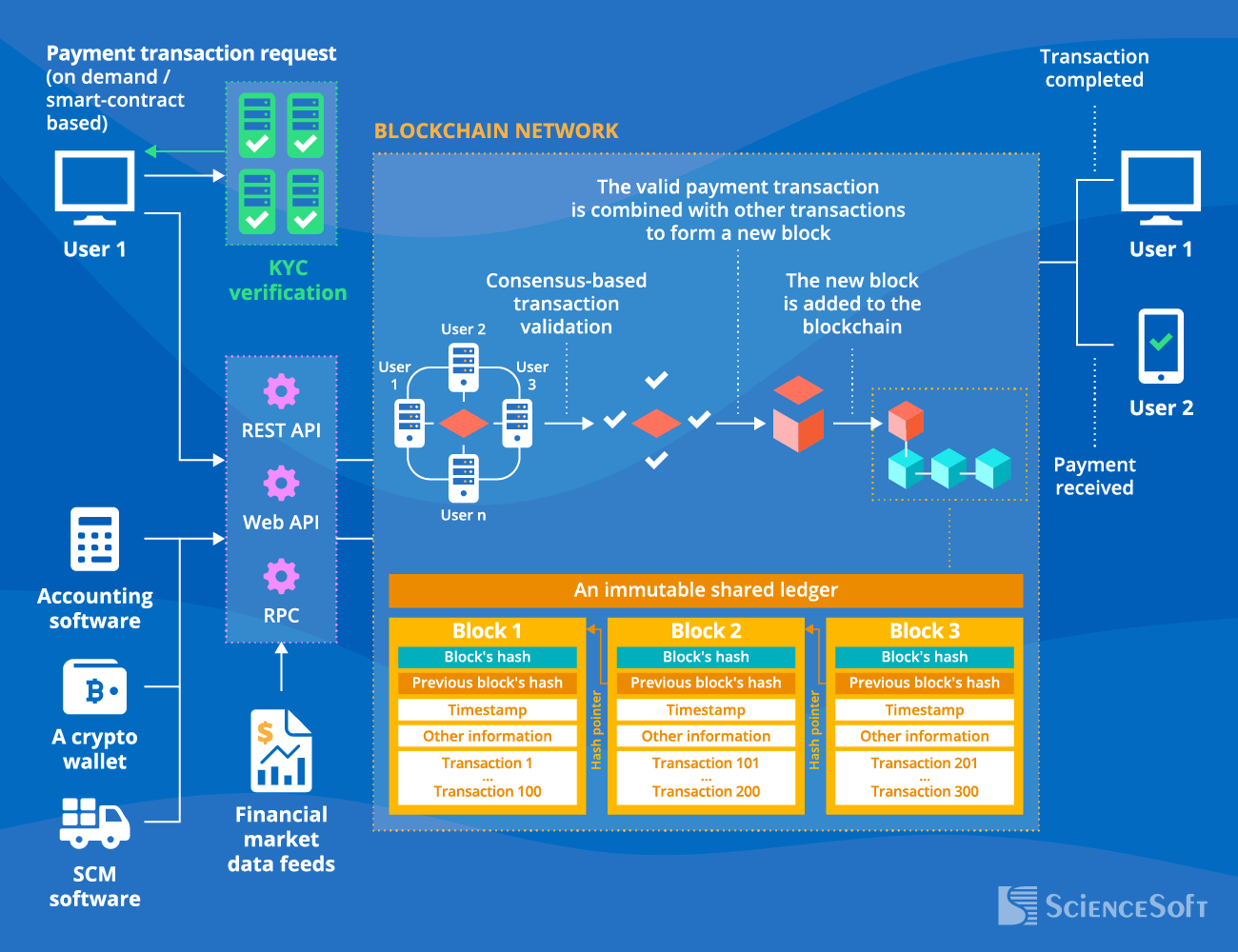Blockchain for Payments
Use Cases, Features, Challenges, Costs
In paytech since 2005 and in blockchain development since 2020, ScienceSoft helps businesses design and build robust blockchain-based payment solutions.
Blockchain for Payments: The Essence
Blockchain payment systems help reduce cross-border remittance costs by up to 80%, handle payment confirmation and processing in seconds rather than days, ensure transparency, security, and full traceability of payment-related data.
Blockchain Payments Market
The global blockchain market is expected to grow from $20.16 billion in 2024 to $393.42 billion by 2032 at a CAGR of 43.65%. Payments are considered the largest blockchain use case segment: in 2022, payments accounted for 44% of the global blockchain revenue.
The main drivers for the popularity of blockchain-based payment solutions are increasing demand for payment data transparency and traceability, as well as for fast, secure, and cost-effective processing of payment transactions. The Payments Association believes that the recent blockchain initiatives by card network giants Visa and Mastercard – which have a combined market share of more than 70% – will spur mainstream blockchain adoption in payment systems.
Juniper Research estimates that the use of blockchain for cross-border settlements will help banks unlock 3,300x growth in cost savings: from $301 million in 2021 to $10 billion in 2030.
How Blockchain for Payments Works
A sample architecture
Below, ScienceSoft shares a sample architecture of blockchain payment solutions we deliver, describes its key components and payment processing flow:

Payment transactions in the blockchain are initiated by network participants or automatically enforced by smart contracts upon pre-defined events. The requested transaction is broadcast to the peer-to-peer (P2P) network of nodes that validate the transaction based on the pre-defined consensus protocol. Once validated and encrypted with a hash function, blockchain data is stored in timestamped blocks linked in chronological order. The blocks form a distributed ledger that serves as a single source of truth to trace payments-related activities and prove the identity of blockchain users. All network members maintain their own copies of the shared ledger that get auto-updated as new data appears.
Users interact with a blockchain to send, receive, and trace payments using role-specific web and/or mobile applications (e.g., for individuals, businesses, financial services providers).
The blockchain solution can be integrated with a crypto wallet, accounting software, financial data marketplaces, as well as with case-specific systems, such as ecommerce platforms or supply chain management software.
Main use cases
Domestic payments
Fast and convenient peer-to-peer payments for retail, healthcare, public transportation, entertainment, hospitality, and other industries, including QR-code-based payments for face-to-face environment.
Fast and cost-effective international payment transactions with no need for intermediaries, such as financial institutions or governmental entities. End-to-end visibility into all payment data and transactions for enhanced transparency and improved control of financial operations.
Trade finance
Tamper-resistant records and full traceability of financial obligations among the trading partners. Automated payment enforcement upon pre-defined events to ensure timely fulfillment of multi-party agreements and minimize payment delays.
Tax payments
Automated tax payments to avoid late filing penalties and prevent tax fraud. Immutable records of taxable amounts, supporting documents, and tax payment transactions to ensure consistent and compliant tax reporting under different jurisdictions. It also helps facilitate tax audits for tax authorities.
Key features
In blockchain-based payments projects, ScienceSoft usually implements solutions with the following set of features:
Real-time payment processing
Blockchain provides near-instant processing of domestic and international payments, including recurring payments, with no involvement of third parties. Transactions are processed on a 24/7 basis without cut-off times.
Automated recordkeeping
All payment transactions and relevant data from the connected systems (e.g., data on currency exchange rates and payment-related documents) are automatically validated, timestamped and recorded in the immutable distributed ledger.
Payments traceability
The distributed ledger enables the blockchain participants to monitor all payment transactions in real time and trace their history end to end.
A full audit trail for payment-related documents
Blockchain records and stores data on all manipulations across payment-related documents (invoices, receipts, bills of lading, letters of credit, etc.), including details on document creation, editing, viewing and sharing.
Support for multiple currencies
Blockchain can support seamless payment transactions in required cryptocurrencies, including custom cryptocurrencies.
QR-code-based payments
Sending and receiving payments by scanning a QR code that contains data about a receiver’s crypto wallet address and a selected currency.
Smart contract-enabled automation
Smart contracts serve as rule-based instructions to automatically enforce payment transactions pre-agreed by the involved parties when certain conditions are met (e.g., making a payment to the supplier upon product delivery).
Transaction e-signing
Each blockchain participant has a unique digital signature to e-sign the submitted payment transactions and prove their ownership.
Consensus-based validation of payment data
Payment transactions are automatically validated and prioritized for processing and storage according to the rules specified by a pre-defined consensus protocol, e.g., proof-of-stake (for public blockchains) or selective endorsement (for private blockchains).
Hashing
Blockchain automatically generates a hash value (a unique cryptographic identifier) for each data block in the network. If payment transactions data in one block changes, hash values of all consequent blocks will change, which makes the data tamper-evident.
Security
Payment data safety in blockchain is supported by multi-factor authentication, including biometric authentication (e.g., facial or fingerprint recognition), payment data encryption, fraud detection algorithms, and more.
Automated KYC/AML verification
Blockchain offers automated customer identity verification according to KYC/AML requirements, provides an immutable audit trail for all customer information updates, enables real-time customer authentication.
Success Stories of Blockchain for Payments
JPMorgan Chase & Co. drastically reduces transaction processing time and cost
In 2017, Wall Street banking giant JPMorgan Chase & Co., with the participation of Royal Bank of Canada and ANZ, launched Interbank Information Network (IIN), an interbank payment platform powered by blockchain. The platform provides real-time processing of interbank and cross-border payment transactions, streamlines the management of financial documents, maintains an immutable record of all transactional data.
Blockchain and smart-contract-based automation helped JPMorgan Chase & Co. reduce bank transfers processing time from 3 days to 1 hour and decrease the fees for cross-border transactions from 5–30% to 2–3%, which resulted in considerable operational cost savings. Also, the bank got improved accuracy and full visibility of transactions-related financial documents. In 2019, JPMorgan Chase & Co. launched their own digital currency called JPM Coin to facilitate and speed up global payments between its business clients.
A fintech startup raised $21mln in 4 years and got acquired by the key DeFi market player
A Portuguese fintech startup has developed Utrust, a blockchain payment processing solution that enables businesses and individuals to easily send and receive cryptocurrencies. The solution enables payments in 30+ cryptocurrencies and offers automated conversion of the received amounts to the user-defined fiat currency. It supports QR-code-based payments, facilitates traceability of transactions, smoothly integrates with major ecommerce platforms, such as Adobe Commerce (Magento) and WooCommerce, and crypto wallets (Binance wallet, Coinbase wallet, ZenGo, etc.).
The startup raised $21 million in funding from 2017 to 2021. In 2021, Utrust was used by over 100 businesses in 180+ countries. In 2022, Utrust was acquired by Elrond Foundation, a EU-based DeFi company owning the 10th largest DeFi ecosystem with $2.06 billion in TVL (2021).
Technology Stack for Blockchain Implementation
To deliver reliable blockchain-based payment solutions, ScienceSoft relies on a range of mature technologies, including:
The Challenges of Blockchain for Payments
Below, ScienceSoft lists typical challenges of blockchain payment projects and describes how they can be solved.
Challenge #1: The need for real-time financial market data feeds
Blockchain needs to access up-to-date foreign exchange rates for fiat currencies and cryptocurrencies to accurately settle and record multi-currency payment transactions. Thus, the solution has to seamlessly collect relevant financial market data from off-chain sources.
SOLUTION
Solution
Blockchain oracles ensure fast and easy access of blockchain smart contracts to the relevant external financial data. They serve as a bridge between a blockchain network and the outside world. Oracles query, verify, and authenticate external data sources and transmit the required exchange rates to the smart contracts.
Hide
I recommend our clients to build decentralized oracles to leverage consensus-based validation of foreign exchange rates from multiple off-chain sources prior to relaying the data to the blockchain. It helps increase the reliability of financial market data feeds and minimize smart contract security risks.
Challenge #2: Adjustment of smart contracts
Once specified, the rules of smart contracts (for payment transactions processing and triggering payment-related events) become immutable. However, in real life, smart contract logic may require periodical adjustments, for example, to handle changes in payment terms or enable potential improvements of the blockchain solution.
SOLUTION
Solution
Consider developing proxy contracts to enable updates and iterative development of smart contracts. A proxy serves as a configurable access point that defines the relevant smart contract implementation logic. While smart contract code remains immutable, using a proxy, you can deploy new contract versions and set their logic as default thus changing the payment processing flow.
Hide
To avoid frequent adjustments of smart contracts, ensure the accurate formalization of business rules in smart contracts already while planning a blockchain solution. Payment processing logic scenarios in smart contracts should be designed with a view to existing contractual agreements between the trading parties, potential changes in payment terms, supply terms, or legal regulations, potential force majeure events, and more.
Challenge #3: Protection of sensitive payment information
Dealing with sensitive payment-related data of businesses and individuals poses strict security requirements for the blockchain-based payment solution. Although blockchain provides robust identity verification and data encryption algorithms, it can be susceptible to certain types of cyberthreats, such as routing attacks, phishing attacks, and code exploitation.
SOLUTION
Solution
ScienceSoft augments the blockchain payment system with additional cybersecurity mechanisms (e.g., AI-powered fraud detection algorithms) and recommends performing periodic network vulnerability scanning to minimize cybersecurity risks. Also, we help design effective blockchain data backup protocols, thoroughly test smart contract code, and provide the solution users with cybersecurity guides.
Hide
Costs of Blockchain-Based Payment Software
The cost of blockchain payment software development varies greatly depending on:
- The number and complexity of a solution’s functional modules, including smart contracts.
- The number and complexity of web and/or mobile applications for various user groups to interact with the blockchain solution.
- Blockchain network type – private, consortium, or hybrid – and a selected consensus algorithm (for blockchain solutions built from scratch).
- The chosen blockchain platform (for platform-based blockchain solutions).
- The number and complexity of potential integrations with relevant software (e.g., a crypto wallet, accounting software, financial data marketplaces, selling platforms, etc.), which influences integration API development.
- Requirements to a blockchain solution performance, scalability, cross-chain interoperability, and security.
- The required scope (PoC, MVP, a full-scale solution), which influences the duration of the development project.
On average, companies see the payoff of custom blockchain development in 12–18 months.

From ScienceSoft’s experience, the development cost for an MVP of blockchain-based payment software will be around $80,000–$150,000. A full-featured blockchain payment solution that comprises a private network and smart contracts may require $400,000–$2,000,000+ in investments.
Want to know the cost of your blockchain solution?
Blockchain for Payments Consulting and Development by ScienceSoft
Relying on 36 years of experience in software development and expertise in 30+ industries, ScienceSoft offers consulting and development services to help customers build reliable blockchain-based payment solutions.
Blockchain for payments consulting
- Analyzing your business needs and eliciting requirements to a blockchain payment solution.
- Suggesting optimal architecture design and functionality for the solution and a tech stack for its implementation.
- Preparing an integration plan with required software (e.g., a crypto wallet, accounting software, selling platforms, financial data marketplaces).
- Blockchain security consulting.
- Delivering a roadmap for blockchain development, including a risk mitigation plan.
Blockchain for payments development
- Business needs analysis and requirements elicitation for a blockchain-based payment solution.
- Blockchain software conceptualization.
- Architecture design of blockchain for payments.
- Blockchain solution development.
- API development to expand the solution’s integration capabilities.
- Quality assurance.
- Preparation of user training guides (optional).
- Blockchain software support and evolution (if required).
About ScienceSoft
ScienceSoft is a global IT consulting and software development company headquartered in McKinney, Texas. We help our clients design and build blockchain for fast, secure, and cost-effective processing of payment transactions. In our blockchain projects, we employ robust quality management and data security management systems backed up by ISO 9001 and ISO 27001 certification.



